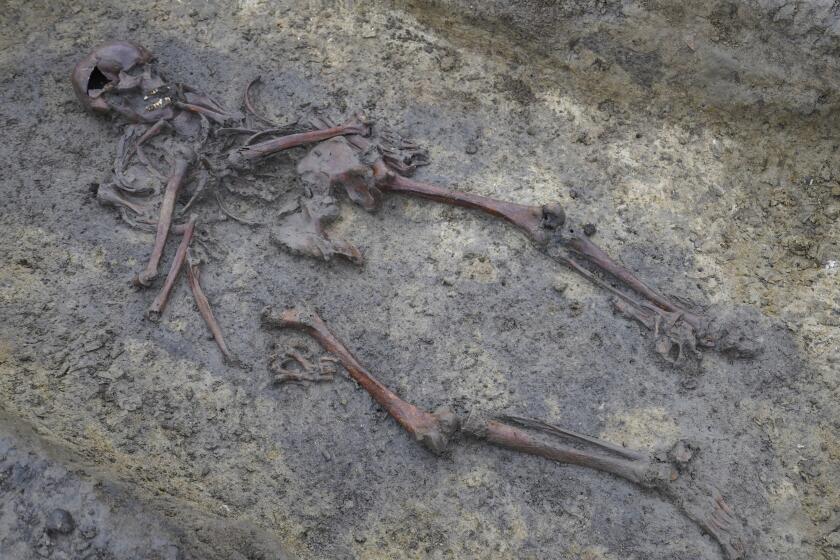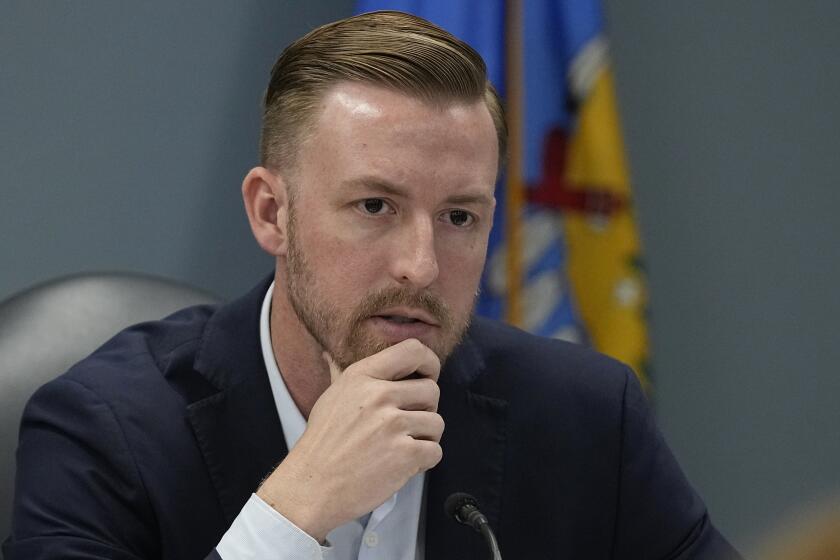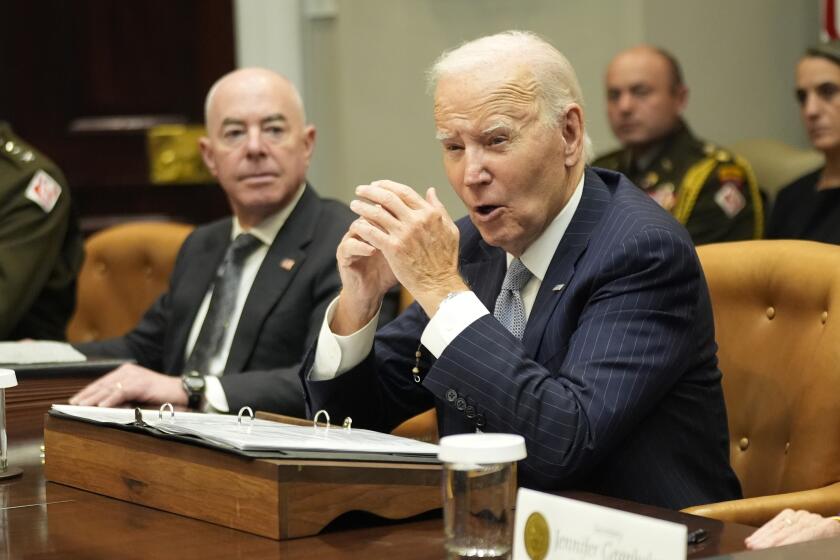Authority of Iraqi General Questioned by Myers
Iraqi Maj. Gen. Jassim Mohammed Saleh consolidated his military role Sunday, even as Shiites, Kurds and the top U.S. general in Washington questioned whether he was the man to lead Iraqi troops in this predominantly Sunni city.
As residents began to pour back to their homes, U.S. Marine and Iraqi brass said that the transfer of responsibility for providing security to this beleaguered city was going smoothly.
“We are doing very well,” Saleh said after his daily meeting with Marine officers. “We want to thank the Marines for their help.”
Marine Maj. Gen. James N. Mattis, commander of the 1st Marine Division, told Saleh to be cautious when his troops finish moving into the city, replacing Marines who are taking positions in the countryside outside the city.
However, Saleh’s emergence as head of the 1st Battalion of the new Fallouja Brigade -- a force composed largely of former army officers that will patrol the defiant city -- is becoming more contentious.
Kurdish and Shiite Muslim officials have already condemned the appointment of the general, who served in Saddam Hussein’s Republican Guard, a force heavily implicated in the oppression of Shiites and Kurds.
Saleh, like the majority of Fallouja residents, is a Sunni Muslim. Sunnis were favored under Hussein but have complained of being marginalized under the U.S.-led coalition’s rule. Many members of the Fallouja Brigade are, like Saleh, Sunnis from the Fallouja area, officials say.
On Sunday, Air Force Gen. Richard B. Myers, chairman of the Joint Chiefs of Staff, said Saleh was not likely to be chosen as the ultimate head of security in Fallouja.
“He has not been vetted yet and probably won’t be the one in command,” Myers said on “Fox News Sunday.”
“There are people that know his record, know what he’s done in the previous Saddam Hussein regime,” Myers said on CBS’ “Face the Nation.”
“They’re going to have to find an appropriate role, if a role at all, for him,” Myers said.
But Lt. Gen. James T. Conway, commanding general of the 1st Marine Expeditionary Force here, has said that senior officers recruited for the new Fallouja Brigade were checked against intelligence records to be sure they did not have “blood on their hands.” Saleh’s background passed the test, he said.
“Most of these guys may not be squeaky clean, but they’re pretty clean,” Conway told reporters Saturday.
Myers also criticized the reporting from Fallouja.
“The Marines have not withdrawn from Fallouja,” Myers said on “Face the Nation.” “They are not withdrawing from Fallouja.”
But by early morning today, all but a handful of Marines had left the city. Among the last units to leave was the 2nd Battalion, 1st Regiment from Camp Pendleton.
The battalion was engaged in some of the most intense firefights of the seven battalions assigned to the Fallouja mission.
“This enemy has no redeeming qualities,” said Maj. Joseph Clearfield, the battalion’s operations officer. “But if [the enemy] has a shred of intellectual honesty, he has to admit we could have finished this off in a few days.”
Several hundred of Saleh’s newly recruited soldiers were in the city on Sunday, with several hundred more expected to arrive by midweek. They have yet to venture into the neighborhoods where fighting was fiercest.
“Be very careful,” Mattis told Saleh through an interpreter. “I know you know Fallouja better than we do, but there are still enemy out there.”
Marines have said they will return to Fallouja and renew their fight with insurgents if the new Iraqi forces prove incapable of containing the uprising.
For the fourth straight day, Marine and Iraqi officers met for several hours in a nondescript building outside one of the checkpoints established by the Marines when they cordoned off the city on the night of April 5.
As word of the newly forming Fallouja Brigade began to spread in Iraq, many of the estimated 100,000 people who had fled the city -- about a third of the population -- began to return. The main route from Baghdad was packed with cars with families.
Marines, backed by Iraqi troops, performed cursory checks. Their goal was to prevent insurgents from getting into the city.
Although the insurgents were not part of the agreement between the Marines and four former Iraqi generals, they appeared to be making an effort not to disrupt the transfer of power. For the second day, there were no reported attacks on Marines by insurgents.
Mohammed Latif, considered the top official in the new Fallouja Brigade, said many of those who took up arms against the Marines were not hard-core anti-Westerners but local residents who reflexively opposed outsiders.
“Most people were not friends of Saddam,” said Latif, a former senior officer and director of intelligence for the Iraqi army who was later exiled by Hussein. “They were imprisoned, tortured by this bad regime.”
Latif’s view is consistent with that of some Marine officers who have said the insurgency was driven in part by the suspicion Fallouja residents feel toward outsiders, not just Americans.
On one point, the Marines and Iraqi generals agree: A focus of the new military strategy will be to find the foreign fighters among the insurgents. Asked if he had a vigorous strategy for finding the foreign fighters, Latif smiled broadly and said, “Yes, but I cannot talk about it.”
As proof of how quickly, and profoundly, the Marines’ role in the Fallouja campaign has changed, some of the Marines who until recently were planning an assault are now looking to manage a cleanup campaign of the rubble and other debris left by the month of fighting.
Col. Jesse Parker, a reservist and civil engineer, was attempting to find Iraqi contractors interested in three $500,000 contracts. “What we want to do is to fix things,” he said. “Militarily, the success of our mission is to improve their quality of life.”
The U.S.-led Coalition Provisional Authority has earmarked more than $100 million for Fallouja for hospitals, schools, roads, infrastructure and other projects, but none of the money can be spent until the city is safe.*
Times staff writer Patrick J. McDonnell in Baghdad contributed to this report.
More to Read
Sign up for Essential California
The most important California stories and recommendations in your inbox every morning.
You may occasionally receive promotional content from the Los Angeles Times.










